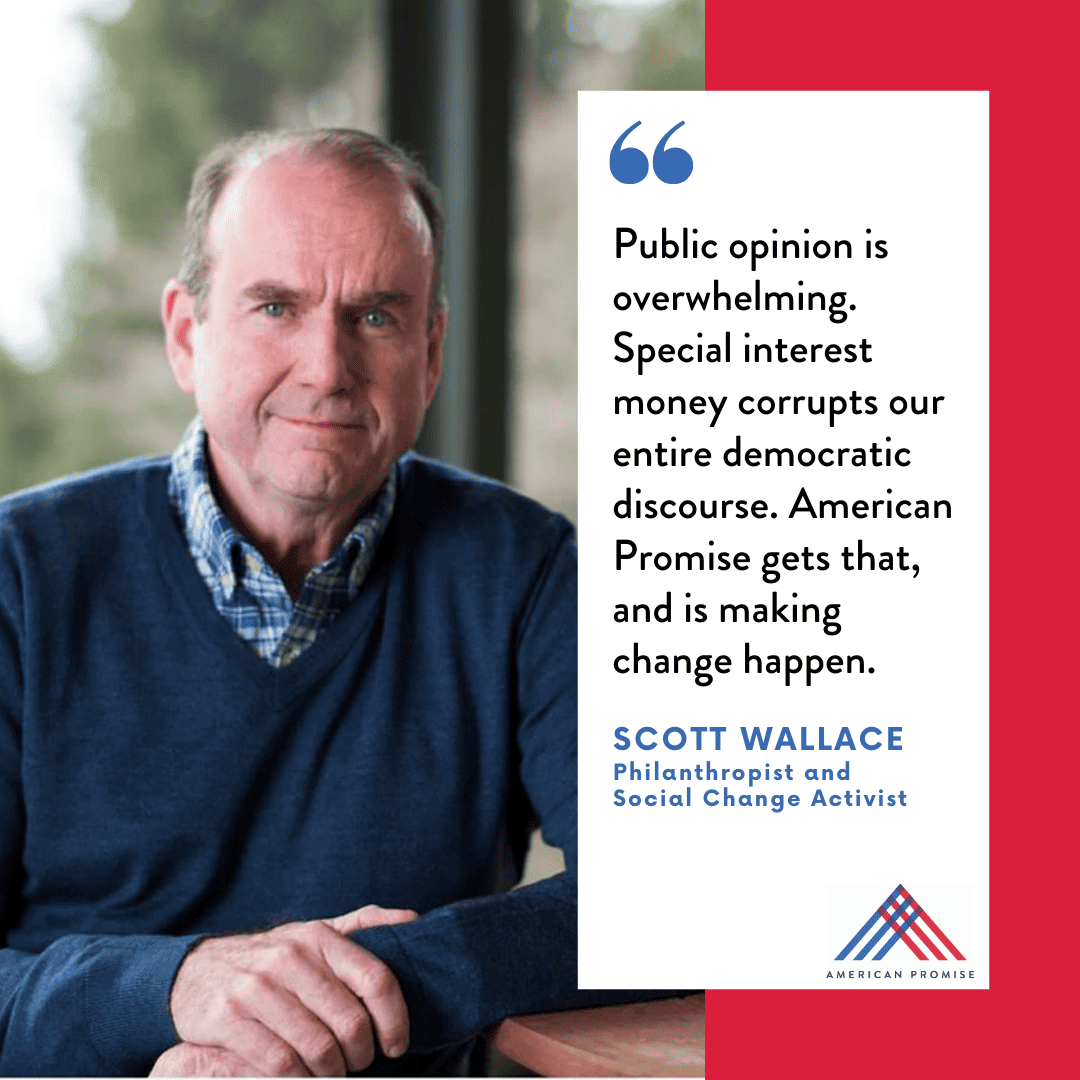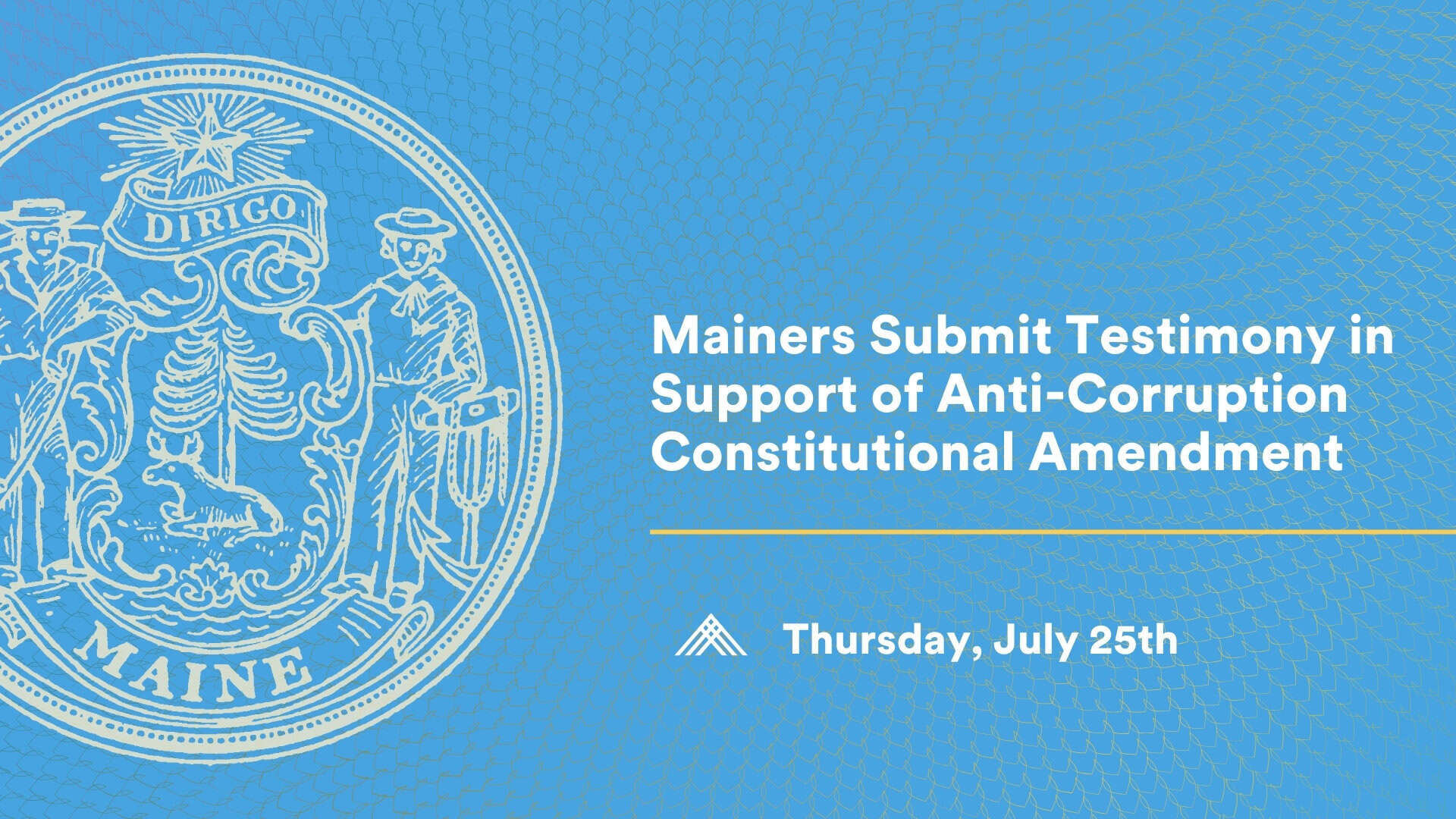Within the American Promise community, we find a diversity of perspectives that parallels our nation’s many differing viewpoints. Here we have taken a few minutes to speak with some of the investors, leaders, and partners in this movement to discuss interests, learn about occupations and preoccupations, uncover current and historical heroes, and find common ground around a shared commitment to the American Promise mission.
Scott Wallace is a social change activist, philanthropist, and former attorney who ran to represent Pennsylvania’s 1st Congressional District in 2018. During that election, Scott saw firsthand the effects of political spending from malicious, sometimes untraceable, sources. He has since become a supporter of American Promise and attended the 2019 National Citizen Leadership Conference.
As supporters of a Constitutional remedy to our pay-to-play political system, American Promise citizen leaders are familiar with examples of how political spending can distort our nation’s politics and governance. Scott Wallace, however, had a more personal experience with these corrosive effects. In 2018, Scott ran for Congress in Pennsylvania and came up against a more than $10 million opposition campaign, primarily funded by ultra-wealthy donors. The ads included disingenuous personal attacks.
Since his campaign ended, Scott has become a supporter of American Promise and attended the 2019 National Citizen Leadership Conference, where he was inspired by the grassroots action building around the American Promise Amendment. We spoke with Scott recently to hear more about his experience with money in politics and why he supports the 28th Amendment.
What is your occupation/vocation?
Social Change Activist, Philanthropist, recovering attorney and congressional candidate.
What is your preoccupation?
Our endangered democracy. Not just the pollution of money but the threat to the right to vote, especially the virus-driven need for nationwide transition to mail-in, absentee and early voting.
What is your current state of mind?
I am fearful it will take years to recover healthwise and economically from this crisis, yet am curiously hopeful that we may be on the threshold of a new New Deal, a reversal of the conservative dogma that taxes are theft and government is useless, toward a belief that our national government can and should be a force for good in the lives of ordinary people.
What was it like running for office?
Nasty. Running for Congress, I refused to take corporate PAC money, while my opponent was happily awash in corporate money. I thought for sure the voters would prefer a representative solely devoted to the interests of the people rather than his corporate paymasters. But then came the deluge of vicious and untruthful personal attacks, fueled by a shocking $11 million in Super PAC funding, overwhelmingly paid for by two insanely influential billionaires, Sheldon Adelson and Charles Koch. It’s a dirty and expensive business.
Which historical figure(s) do you most identify with?
My grandfather, Henry A. Wallace, plant geneticist, businessman, journalist, 11th U.S. Secretary of Agriculture, and 33rd Vice President of the United States. In the 1940s he framed what he saw as an eternal struggle between the “common man” and what he called “American Fascism”—when corporations capture government to protect and preserve their own power and privilege. Our foundation, the Wallace Global Fund, founded by him long ago, is guided by this vision and works to empower ordinary people and movements that demand a government that works for them, and accountability against corporate abuses and governmental complicity.
Which living people do you most admire?
Elizabeth Warren—she is brilliant and attuned with ordinary people. And Bryan Stevenson, a champion of justice reform. I think he’s up there with Martin Luther King Jr. and Nelson Mandela.
What are you reading now?
I love Doris Kearns Goodwin’s book Leadership In Turbulent Times, about Lincoln, Teddy Roosevelt and FDR. Makes me wistful for how we might improve. I liked Rachel Maddow’s book Blowout about the corruption of the oil and gas industry. And next I plan to read Goliath by Matt Stoller about monopoly power in America.
What drew you to American Promise?
The lessons I learned from my Congressional run: the overwhelming power of special interest money to corrupt our democracy. Citizens United must die, either by the Supreme Court confessing its own false and naive assumptions, or by Constitutional amendment. Whatever it takes, I’m there.
When I attended American Promise’s National Citizen Leadership Conference, I was most impressed by how we could organize grassroots energy to build political support at the state level and in state legislatures to drive the national effort. Public opinion is overwhelming. Special interest money corrupts our entire democratic discourse. American Promise gets that, and is making change happen.







